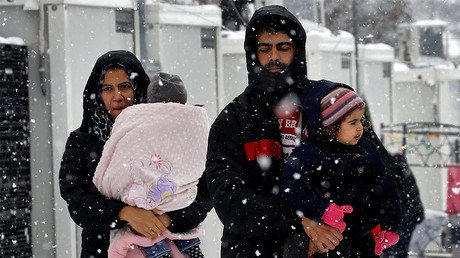Merkel to present program to speed up deportation of failed asylum seekers – reports

German Chancellor Angela Merkel is planning to present a new plan to accelerate the process of deporting failed asylum seekers, including special “departure centers” and more financial aid for those deciding to leave voluntarily, German media reports.
The chancellor is expected to present a draft resolution containing a new 16-step plan that should significantly ease the deportation of failed asylum seekers in the future at her meeting with the heads of German regional authorities on Thursday, German weekly Der Spiegel reports.
“The number of the failed asylum seekers, who are subject to expulsion, will continue to rise in 2017,” the paper seen by Der Spiegel, Stuttgarter Nachrichten and Stuttgarter Zeitung says, adding that the situation requires “nationwide efforts aimed at the improvement of the deportation policy.”
Merkel said earlier that up to 40 percent of asylum applications filed in Germany are denied, according to the Bild daily. Just recently, she claimed that in the coming months the government’s policy will focus on “repatriation, repatriation and once again repatriation.”
The new deportation plan envisages creation of a new “national center for deportation assistance” under the auspices of the Interior Ministry in the next three months. The center will be tasked with coordination of all collective deportations of refugees and migrants.
It will also “collect all necessary documents for persons subjected to expulsion in all problematic cases,” according to Der Spiegel. The concept of “problematic cases” apparently refers to situations in which failed asylum seekers have no valid documents or their countries of origin refuse to issue travel documents for them and accept their repatriation, as in case of Anis Amri, a Tunisian citizen who carried out a terrorist attack in Berlin in December.
The German government also plans to establish special “federal departure centers,” where failed asylum seekers will be accommodated and kept under control of the federal authorities “in the last days or weeks” before deportation.
Deportation procedures for foreigners suspected of “posing a significant threat to the lives” of people in Germany should also be significantly eased under the government plan. At the same time, the Federal Office for Migration and Refugees (BAMF) will be allowed to examine the cellphones, smartphones and SIM-cards of newly arrived asylum seekers to establish their identity.
Medical examinations needed to confirm that the failed asylum seekers are healthy enough to be deported should also be “improved” in the future to speed up deportation procedures, the document says, according to Der Spiegel.
The program also includes higher payouts to those refugees who agree to leave Germany voluntarily and return to their countries of origin. “The sooner those [whose asylum applications were denied] decide to return to their country of origin voluntarily, the higher payout they will get,” the document says, as cited by Der Spiegel.
The government is planning to spend € 90 million ($96 million) on deportation and integration programs in 2017, the weekly says.
The document, which was initially based on the program developed by German Interior Minister Thomas de Maiziere and the Justice Minister Heiko Maas after the December Berlin attack, has yet to be approved by the heads of German regional governments on Thursday.
However, the federal German government’s plans to speed up refugees’ deportations are encountering resistance from some regions mainly governed by Social Democrats, as well as the representatives of the Left and the Green parties.
Berlin, Schleswig-Holstein, Lower Saxony, Bremen and Rheinland-Palatinate have recently expressed their opposition to the government’s idea of accelerating deportations of failed Afghan asylum seekers, citing the UN reports about the deteriorating security situation in Afghanistan.
The head of the Pro Asyl group (a pro-refugee group), Guenter Burkhardt, criticized the plan for giving too much powers to federal authorities while also questioning the idea of sending people back to troubled states such as Afghanistan.
In late December, Merkel announced the government’s plans to accelerate the repatriation procedures for failed asylum seekers from Tunisia following the Berlin Christmas market attack carried out by a Tunisian citizen.
In early January, the EU statistics office, Eurostat, released a new report that shows that Germany had processed around 420,000 asylum requests between January and September 2016 – more than the other 27 EU countries combined.















